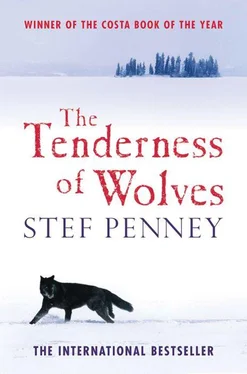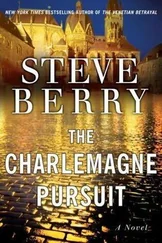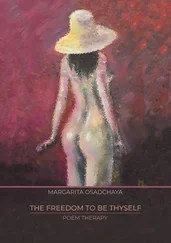Nearby, the two horses stand nose to tail, heads down. At some point, when she is very cold, one of them starts, spooked at something in the trees. It flattens its ears along its skull, weaving its head from side to side as if it detects a threat but does not know exactly where it is. The other horse–the sick one–barely moves. Line, after the initial, heart-wrenching shock, strains into the darkness, hoping to hear Espen, but knowing that Jutta would not react that way if it were him. She hears nothing. Eventually, she can wait, nor fend off sleep, no more, and curls up beside her children, wrapping her shawl over her face.
She dreams, almost instantly, of Janni. Janni is in trouble and seems to be calling for her. He is somewhere dark and far away, and cold. He says he is sorry for his foolishness, for thinking he could make money this way, by theft and mutiny. Now he is paying with his life. She can see him from an immense distance, and he seems to be lying in the snow, a tiny dark speck in a vast field of white, and he cannot move. She yearns with all her being to go to him, but she cannot. Then it all changes and he is right there with her, so close she can feel his warm, moist breath on her face. In the dream she closes her eyes and smiles. His breath smells rank, but it is warm and it is his. She doesn’t dream of Espen at all.
She wakes before it is fully light. The fire is out, a sodden charred mess; the air is wet and smells of thaw. She looks around. She cannot see the horses; they must have moved off behind the shelter, foraging for food. No sign of Espen–but then, she didn’t really think there would be. She pushes herself onto her elbows, her eyes becoming used to the grey-ness. And then she sees the trampled and stained snow only twenty yards away.
At first she refuses to accept that the dark-red stains are blood, then detail piles on vile detail: a spray of red arcs across the snow there; here a smear of red, and a staccato of hoof prints, stabbed into a deep drift. She makes no sound at all. The children must not see this, or they will panic … Then she looks down.
Between her elbows, pressed into the only untouched patch of snow that remains outside the shelter, is a paw print. Just one. It is at least four inches across, with the prick-holes of claws ranged in front of it. A dark-red stain colours two of the prick-holes.
With a sick jolt, she is reminded of what Espen called her: a vargamor–a woman who consorts with wolves. She tastes bile, remembering the warm stinking breath from her dream, and how she revelled in it. The wolf must have stood right over her, leaning into the shelter, panting into her face as she slept.
Line gets up as quietly as she can. She kicks snow over the worst of the traces, scattering clods of snow over the parabola of blood. She can see the trail as Bengi tried to get away, followed by the wolves–there must have been more than one. Fortunately it leads back in the direction they came from; they will not have to see where, or with what, it ends.
She sees another trail, and stares at it; a boot print crisply outlined near the bole of a cedar. It takes her a long moment to realise that this is Espen’s boot print, from yesterday. He was heading almost due west, whereas their path lies south. No more snow has fallen since he left, nothing to cover his traces. He could have followed his own trail back to them, but for some reason did not.
Line jumps, heart pumping painfully, as Jutta ambles through the trees towards her, and then sighs with trembling relief as the horse sticks her nose in Line’s armpit. The relief seems to be mutual.
‘We’re all right,’ Line tells the horse fiercely. ‘We’re all right. We’re all right.’
She holds onto the horse’s mane until she stops trembling, then goes to rouse the children, to tell them they must go on.
Donald watches Parker and Mrs Ross leave the post. They walk out of the gate and head into the north-west without a backward glance. Nesbit and Stewart wish them a good journey and go back to their offices. Nesbit manages to give Donald an unpleasant, meaningful look as he does so, defaming both Mrs Ross and Parker, and somehow Donald himself, in the process. Donald bears it, but it riles him. He thought Parker a fool when he had explained his reasoning, and worse when he said Mrs Ross was going with him, although it seemed to be Mrs Ross’s wish also. He pulled her aside and told her his opinion. Was it his imagination, or was she amused by him? Both Parker and she impressed upon him the importance of watching Stewart’s movements, and though he thinks there is little point, he supposes he will do it.
He watches Stewart walk over to the village to enquire after Elizabeth. Despite her sullen hostility, Stewart does not cease to take an interest in her. As for himself, he cannot restrain the urge to visit her again. He has developed an overpowering curiosity about her since conceiving the notion that she is one of the Seton girls, albeit based as it is, somewhat tenuously, on the name of her daughter. No, not just that; on her features, which are undoubtedly white, and which to his mind bear a faint but discernible resemblance to those of Mrs Knox. He finds himself outside her hut after Stewart has gone back to his office, waiting for a signal to go in.
The fire stings his eyes, and he breathes through his mouth to acclimatise himself to the smoke and smell of unwashed bodies. Elizabeth squats by the hearth, wiping the face of the little girl, who has been crying. She flings Donald a brief, dismissive glance, and then picks up the squalling child and hands her to him.
‘Take her. She’s giving me the devil of a time.’
Elizabeth walks behind the partition that divides the room from the sleeping quarters, leaving Donald with the girl, who squirms and wriggles in his arms. Nervously, he jiggles her up and down, and she stares at him, affronted.
‘Amy, don’t cry. There, there.’
Were it not for his experiences with Jacob’s children, this would be the first time he had ever held a small child. He holds her as if she were an unpredictable small animal with sharp teeth. However, by some miracle she stops crying.
When Elizabeth comes back, Amy has discovered Donald’s tie and, enchanted by its strangeness, is playing with it. Elizabeth watches for a moment.
‘What made you think of the Setons?’ she asks suddenly. ‘Was it just the name?’
Donald looks up, caught off guard. He had been about to ask her about Stewart.
‘I suppose so. But the story was in my mind, you see, because recently I was told it by someone who was very close to it.’
‘Oh.’ If she has a more than passing interest, she hides it well.
‘I recently made the acquaintance of the family of Andrew Knox. His wife was, well, she is …’ he is watching her now, while the child gives his tie a sharp tug, almost throttling him ‘… she is the sister of Mrs Seton, the girls’ mother.’
‘Oh,’ she says again.
‘She is a delightful, kind person. One can tell that even after so many years, she finds the memory of the disappearance deeply distressing.’
There is a long silence in the hut, punctuated by noises from the fire.
‘What did she say about it?’
‘Well, that it … it broke the parents’ hearts. That they never got over it.’
Donald tries to read her face, but she looks angry more than anything.
‘They–the Setons–are both dead now.’
She nods briefly. Donald finds he has been holding his breath, and exhales.
‘Tell me about Aunt Alice.’ She says it very quietly, with a sort of sigh. Donald feels a great leap inside him. He tries not to show it, or to look at her too hard. She stares at her daughter, avoiding his eye.
‘Well, they live in Caulfield, on Georgian Bay. Mr Knox is the magistrate there, a very fine man, and they have two daughters, Susannah and Maria.’ Emboldened he adds, ‘Do you remember them?’
Читать дальше












